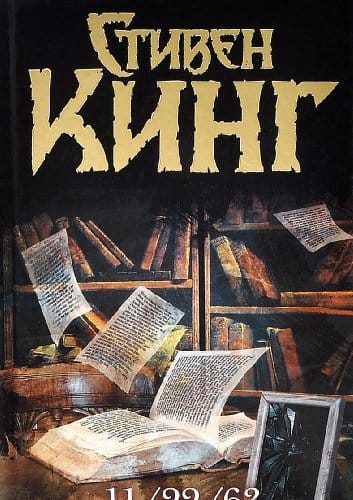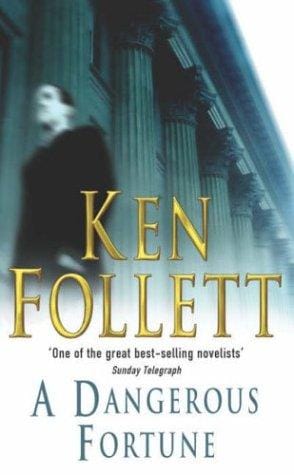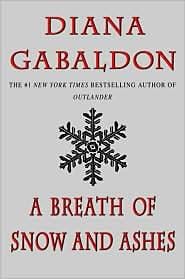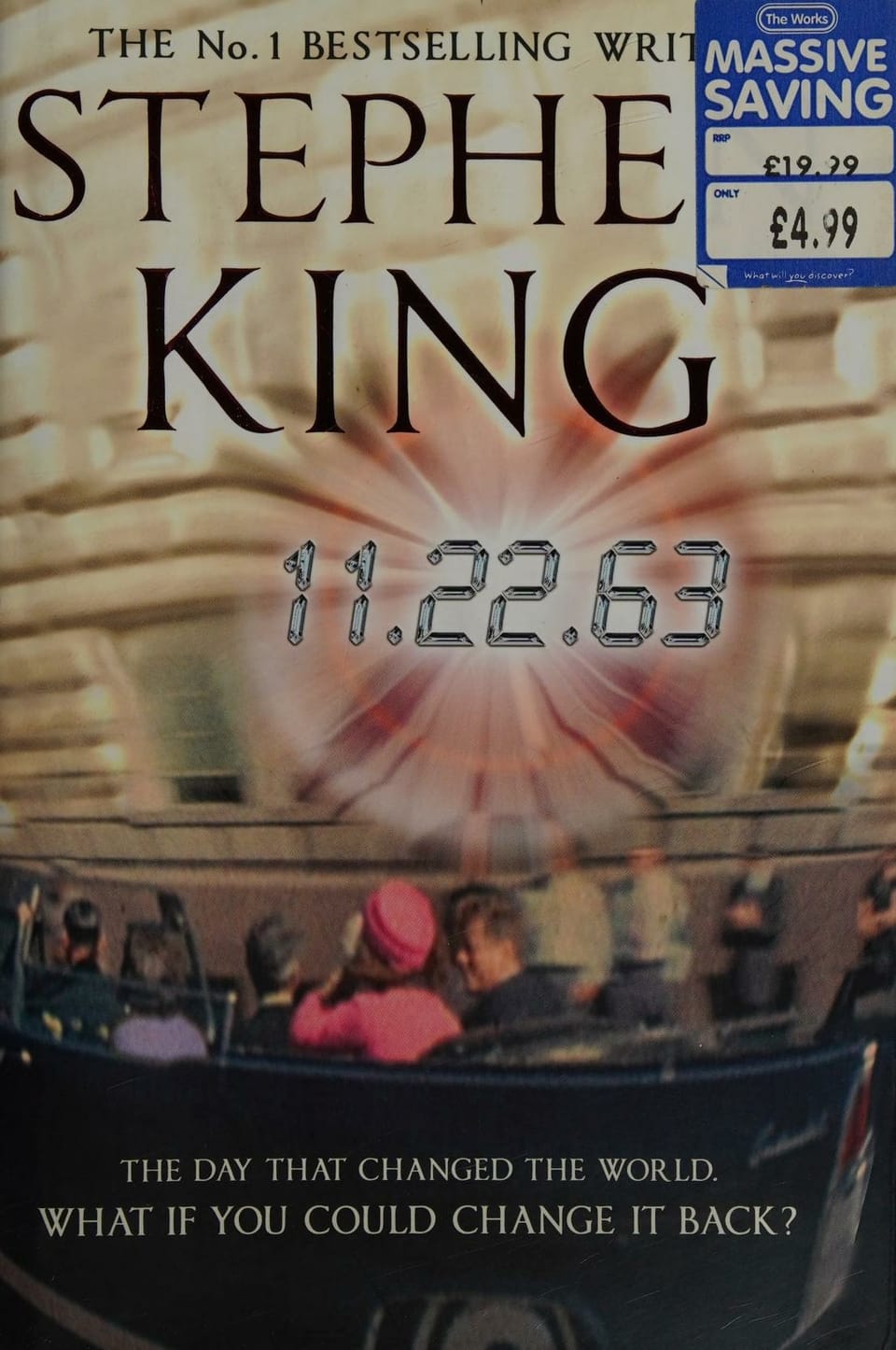11/22/63: Stephen King’s Masterpiece of Time Travel, History, and Heart

Introduction to 11/22/63
Stephen King’s 2011 novel 11/22/63 is far more than a thriller about stopping the assassination of President John F. Kennedy. Blending science-fiction, historical fiction, romance, and suspense, the book asks timeless questions about destiny, personal responsibility, and the unforeseen costs of changing the past. With an average rating of 4.3 on Goodreads and a successful Hulu miniseries adaptation, 11/22/63 has cemented itself as one of King’s most beloved modern works.
Quick Plot Overview
High-school English teacher Jake Epping stumbles upon a “rabbit hole” time portal in a Maine diner owned by Al Templeton. Every trip through the portal resets to the same moment: 11:58 a.m. on September 9, 1958. Al’s failing health prevents him from completing his mission to save JFK on November 22, 1963, so Jake agrees to finish the job. Along the way Jake adopts the alias George Amberson, moves to small-town Texas, falls in love with librarian Sadie Dunhill, and wrestles with the stubbornness of history, which King personifies as “the past harmonizes…and it does not want to be changed.”
The Mechanics of Time Travel
King’s portal is beautifully simple: no machines, no technobabble, just a pantry that dumps the traveler five years before the assassination. However, the simplicity masks a chilling complexity. Each trip nullifies previous changes, creating a single mutable timeline. This rule forces readers to ponder ethical conundrums: How many attempts are justified? When do the personal sacrifices outweigh the potential benefits? The tactile, tactilely described “strings” of time ratchet up the suspense, making every intervention fraught with danger.
Authentic Historical Setting
One reason 11/22/63 resonates is King’s meticulous research into late-1950s and early-1960s America. From the smoky diners of Derry, Maine, to the sun-bleached streets of Jodie, Texas, the sensory details immerse readers in an era before smartphones and GPS. King captures everything: cheap gasoline, Elvis on AM radio, segregated buses, and the omnipresent dread of the Cold War. These vivid settings serve as more than background—they underscore how foreign the recent past can feel, reminding us that history is not a static photograph but a living, breathing environment.
Character Depth Beyond the Central Mission
Jake Epping is a classic King protagonist: ordinary, good-hearted, and haunted by personal failures. His growth from detached divorcé to committed lover and ethical crusader drives the narrative’s emotional core. Sadie Dunhill, scarred by an abusive husband yet fiercely resilient, emerges as one of King’s most endearing female characters. Secondary figures—eccentric janitor Harry Dunning, sleazy Lee Harvey Oswald, and a chorus of small-town Texans—add color and moral complexity. The novel’s length (850+ pages) gives each character space to breathe, ensuring readers care about more than a single historical event.
Themes: Fate, Free Will, and the Butterfly Effect
At its heart, 11/22/63 asks whether changing one huge event can truly improve the world. King explores the butterfly effect by showing Jake a chilling alternate 2011, rife with nuclear fallout and social collapse, after Kennedy is saved. The message is sobering: good intentions cannot guarantee good outcomes, and meddling with time carries unpredictable repercussions. Yet the novel also affirms the human capacity for love and sacrifice; Jake’s final decision respects both personal affection and global responsibility.
Lee Harvey Oswald: Villain, Victim, or Enigma?
Unlike many alternate-history thrillers that reduce Oswald to a cardboard cutout, King paints him as a complex, volatile man propelled by ideological fervor and personal grievances. By placing Jake undercover in Dallas and Fort Worth, the narrative transforms historical spectatorship into nerve-shredding immediacy. Readers shadow Oswald’s daily routines, witness domestic abuse toward Marina, and feel every pulse of doubt: Is he the lone shooter? Will history’s inertia foil Jake at the last second? The nuanced portrayal grounds the suspense in plausible reality.
From Page to Screen: Hulu’s 11.22.63
The 2016 Hulu miniseries, produced by J.J. Abrams and starring James Franco and Sarah Gadon, condenses King’s sprawling epic into eight episodes. While some subplots—especially the Derry interlude and deeper character backstories—were trimmed, the adaptation preserves the central romance and the ticking-clock tension. For viewers new to King, the show offers an accessible gateway; for longtime fans, it provides visual payoff, including meticulously recreated 1960s sets and costumes. Either way, the adaptation revived interest in the novel and introduced the story to a streaming-first audience.
Why 11/22/63 Still Matters Today
In an age of political polarization and rampant misinformation, King’s exploration of rewriting history feels eerily timely. The novel warns against simplistic “if only” nostalgia, suggesting that complex systems resist tidy fixes. Moreover, its compassionate portraits of marginalized characters—African Americans navigating Jim Crow laws, immigrants chasing the American dream—invite modern readers to confront continuing social inequalities. Finally, the book champions literacy and critical thinking through Jake’s vocation as a teacher, subtly advocating for education as society’s best hedge against repeating past mistakes.
Reading Tips for First-Time Time Travelers
Because 11/22/63 is lengthy, consider setting chapter milestones—perhaps two a day—to savor the rich period detail without burnout. Keep a browser tab open for historical names like General Edwin Walker or nightclub owner Jack Ruby; quick fact-checks deepen appreciation. Audiobook enthusiasts will enjoy Craig Wasson’s acclaimed narration, which nails regional accents. And if you are skittish about spoilers, steer clear of JFK conspiracy forums until you have closed the book’s final page.
Conclusion: A Modern Classic
Whether you shelve it under science-fiction, historical fiction, or romantic tragedy, 11/22/63 defies easy classification—and that is precisely its magic. Stephen King leverages his trademark storytelling prowess to weave a tale that is intellectually provocative and emotionally shattering. By the time Jake Epping returns to the present one last time, readers are left pondering their own pivotal moments and the delicate threads that bind personal choices to global history. If you read only one King novel outside his horror canon, make it 11/22/63.


